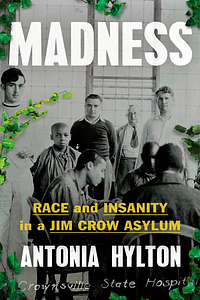You need to sign in or sign up before continuing.
Take a photo of a barcode or cover
challenging
dark
emotional
hopeful
informative
reflective
sad
tense
medium-paced
emotional
informative
sad
The subject matter is heavy but it is important. Important to face our past so we can intentionally move forward.
challenging
dark
emotional
informative
sad
medium-paced
challenging
dark
emotional
informative
sad
medium-paced
challenging
dark
informative
sad
tense
slow-paced
challenging
dark
sad
medium-paced
challenging
emotional
hopeful
informative
medium-paced
challenging
dark
emotional
informative
reflective
sad
medium-paced
informative
medium-paced
Crownsville Hospital Center, also known as the Hospital for the Negro Insane of Maryland, opened in 1911. This facility housed only twelve patients when it opened. Instead of proper care, they were working on tobacco crop harvesting. Patients were also used as free labor to construct buildings on the grounds that would form the hospital proper. The living conditions for the patients were abysmal, despite a newly constructed facility. Tuberculosis, smallpox, and other communicable diseases were rampant. Water and sanitation were poor. Overcrowding would also become a serious issue, as well as lack of staff, especially properly trained staff. It would not be a far stretch to say these patients were experimented on medically with vaccinations and other medications, lobotomies, shock therapies, and a host of other things. Mental health care at this time was severely lacking, but this was also a time when people were confined to these facilities for all kinds of reasons that were not related to mental health.
I have the audible version of this book, which was enjoyable to listen to, despite the enraging topic. I think this book is very important to medical historians and professionals. I firmly believe the treatment of Indigenous people, people of any color other than ghastly white, and women are overlooked in the United States. In fact, the problem has grown exponentially in recent years. This type of content should be common knowledge for everyone. We need to understand how healthcare has improved so we do not return to this abhorrent treatment of human beings. I am pleased to say that the site of this facility is being turned into a memorial park. This was a good book.
I have the audible version of this book, which was enjoyable to listen to, despite the enraging topic. I think this book is very important to medical historians and professionals. I firmly believe the treatment of Indigenous people, people of any color other than ghastly white, and women are overlooked in the United States. In fact, the problem has grown exponentially in recent years. This type of content should be common knowledge for everyone. We need to understand how healthcare has improved so we do not return to this abhorrent treatment of human beings. I am pleased to say that the site of this facility is being turned into a memorial park. This was a good book.






